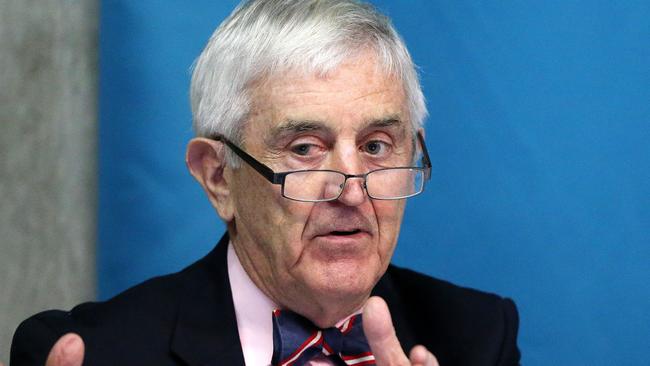Bushfires: ‘Leave and live legacy a life saver’
Black Saturday’s legacy of ‘leave and live’ has saved lives in the latest fires, former royal commission chairman Bernard Teague said.

Black Saturday’s legacy of “leave and live” has saved lives in the latest fires, 2009 Victorian bushfires royal commission chairman Bernard Teague said.
The state royal commission was established following the devastating Black Saturday blazes on February 7, 2009, and produced 67 recommendations including revising the state’s bushfire safety policy by enhancing the role of warnings and improving advice on fire and house defensibility.
Mr Teague, a former Supreme Court judge, said the royal commission was focused on understanding the reasons for the deaths of 173 people, including their approach taken to “stay or go” that he said was “really property-orientated … (now it’s) leave and live”.
“Human life is so important,” he said. He said the royal commission had prioritised saving human life, which had been borne out through the current fires having a greater impact on homes, property, livestock and wild animals.
“That’s really why we have got things like emergency calls being made by premiers in both states, because we want people to live,” Mr Teague said.
He said he was in favour of a national royal commission into the current fires with terms of reference being as wide as possible. “The trouble is you can always be better prepared if you spend enormous amounts of money,” he said.
Mr Teague said the issue was where the money was spent because it was impossible to predict how weather would impact on fire risk through drought or other factors such as lightning strikes.
The 2009 royal commission examined the causes and circumstances of the fires that burned in January-February 2009, the preparation and planning before the fires, all aspects of the response to the fires, measures taken in relation to utilities, and any other matters it considered appropriate.
A key outcome was Emergency Alert Phase 2, a location-based service for mobile phone networks to deliver warning messages.
The commission also proposed a minimum prescribed burning annual rolling target of 5 per cent with annual reporting on prescribed burning outcomes, including publishing details of targets, area burnt, funds expended on the program, and impacts on biodiversity.
Mr Teague said the current fires were very different to previous blazes such as Ash Wednesday, Black Friday and Black Saturday, and people shouldn’t assume the worst was over this season.
“History has told us that for Victoria and Tasmania the worst problems tend to arise from the middle of January through to roughly the middle of February. We can’t afford a ‘the worst has past’ attitude … it will depend on things outside our control,” he said.
Mr Teague said the Black Saturday royal commission had reached out to scientific organisations for witnesses to give evidence to the commission on the impact of climate change.
“We had many scientists prepared to go, obviously … (but) we could not get one scientist who would be cross-examined who would take the other point of view,” he said.
“Taken from 10 years ago, it was an established fact.”
Mr Teague said people who denied a link between climate change and worsening fires were doing so for “commercial and the like reasons”.
“When it comes to the science, it’s all one way,” he said.



To join the conversation, please log in. Don't have an account? Register
Join the conversation, you are commenting as Logout